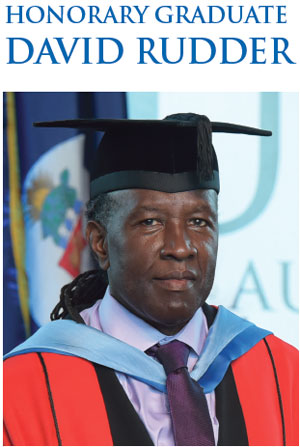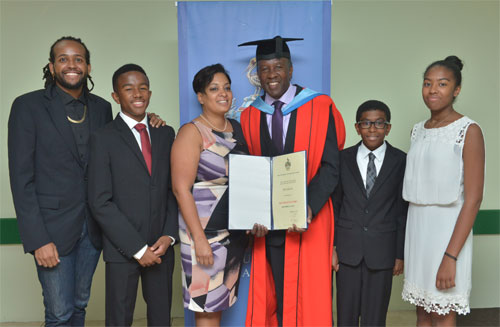
 Citation: David Rudder Citation: David Rudder
Chancellor, have you ever heard lyrics that could “make a politician cringe,” expertly crafted over a melody that could, “turn a woman’s body into jelly”? Have you ever felt pained by the plight of our Caribbean neighbour, Haiti? Have you been obliged, perhaps against your will, to contemplate a Bacchanal Woman or maybe it was a Bahia Girl? Have you wondered if “d hammer gone” to join the longtime band?
Have you ever seen ragamuffin congregate and in the midst of their revelry raise their hands in praise and sheer joy, if not quite reverence, for our Caribbean way of life?
When men and women in purple prepare to do battle on our behalf, even though there may be dread in your heart, have you nevertheless rallied around the West Indies?
When the WTO ruled against the Lomé Convention’s concessions to the region, did you sit up and pay attention when we were warned of the dread future awaiting small Caribbean farms over-reliant on banana production? Or were you lulled by the infectious tune used as the vehicle to deliver the message?
Well, if you felt grief but refused to believe that we good people would forever turn our hearts and eyes away from the plight of Haiti or if you lamented the day Trinidadians learned of uzi diplomacy and SLR love above the bloody asphalt, if any of these apply to you, you may well have been under the influence of the poet/philosopher/singer, David Michael Rudder.
David Rudder was born in Belmont, Trinidad. His early childhood was frequently spent under the care of his grandmother, a Spiritual Baptist. Rhythm and vibrancy would have been abundant in a neighbourhood that was home to both pan yard and Shango yard.
Singing competitions at school and the ease with which he would command a stage at age 9 gave the young Rudder confirmation that music was his calling. At age 11, he started singing American pop and Rhythm and Blues with a group called the Solutions. In 1977 he joined the pioneering calypso band, Charlie’s Roots, originally as a temporary replacement singer for Christopher “Tambu” Herbert.
In 1986 there would be a disturbance in the ether. In the Carnival/Calypso arenas that year, David Rudder won the Young King, the National Calypso Monarch, the Road March King and Trinidad All Stars won the Panorama competition playing Leon Edwards’ arrangement of Rudder’s The Hammer. Rudder’s The Hammer and Bahia Girl announced a new benchmark that he would sustain or exceed. The following years brought the sublime Calypso Music and the album Haiti. His compositions probe the roots of Caribbean culture as well as global politics and the shared human condition. He conducts his examinations with respect and celebration, without restraint, sometimes cutting with a surgeon’s precision, always with freshness, with new perspectives.
 David Rudder has performed all over the Caribbean, North America, Europe and Japan. David Rudder has performed all over the Caribbean, North America, Europe and Japan.
He has been written about in the Barbados Nation and the Gleaner in Jamaica, in the British Sunday Observer and Guardian, in Germany’s Berliner Morgenpost Magazine and Stern Magazine, in Cosmopolitan, Billboard, Ebony Magazine, Class Magazine and Newsweek Magazine.
He has won major awards for his music and been studied by music critics and academics alike. In 1996 he was appointed as a Goodwill Ambassador to the United Nations Development Programme.
He had a leading role in the television drama, Sugar Cane Arrows which was the first Trinidadian drama aired in the USA.
He has contributed to the soundtrack of several movies, most notably the Warner Brothers production, Wild Orchid.
Despite all he has seen, or maybe because of it, he continues to have faith in his people.
“Cause we moving with the power and the glory
See how we float in style
One lovely nation, heading to salvation
The Ganges come meet the Nile.”
Chancellor, for compelling us to respect our history and the often burdensome legacies contained therein, for nudging us to both love and measure ourselves, for deepening the societal and regional conversation, for reminding us that to remain relevant we need to keep finding “more and more ways to keep evolving”, for melodically and consistently swelling West Indian hearts with pride, for outstanding cultural contributions and more, I present David Michael Rudder and ask that by the authority vested in you by the Council and Senate of The University of the West Indies, you confer on him the degree of Doctor of Letters, honoris causa.
St Augustine Campus
October 2015

|





